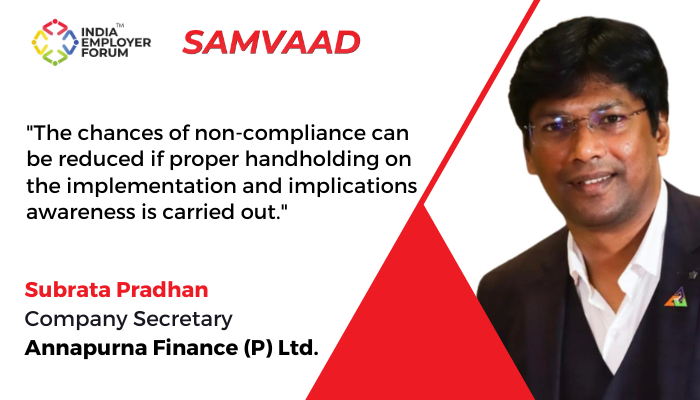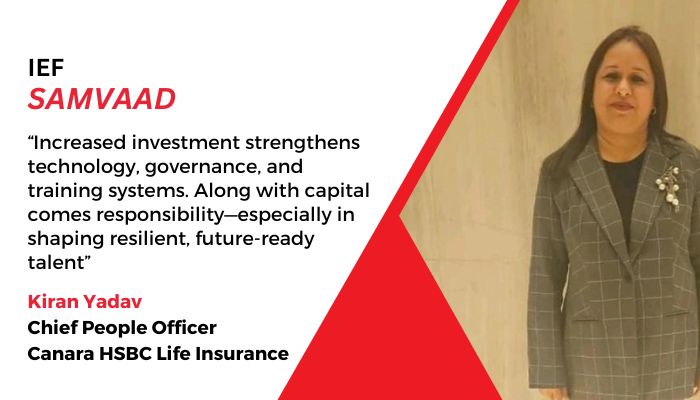Subrata Pradhan, Company Secretary, Annapurna Finance Pvt Ltd speaks to India Employer Forum about the compliance universe, regulatory framework, corporate governance requirements, compliance obligations, best compliance management practices, and more.
Q. What are the major overarching acts, rules and regulations that regulate NBFCs?
The regulatory framework for NBFCs is a combination of multiple acts, rules, and regulations. Apart from the overarching pieces of legislation such as the Companies Act, 2013; SEBI Act, 1992, and RBI Act, 1934, there are specific NBFC regulations, prudential norms, KYC guidelines, Fair practices code, norms on asset classification, securitisation of assets, and corporate governance standards among others for deposit and non-deposit taking NBFCs. However, regulations issued by RBI supersede those notified by SEBI and under the Companies Act in case of contradictions.
Q. How is the compliance universe for NBFCs different from banks?
The regulator, i.e. RBI, always focuses on the category of customer to whom the regulated entity will serve and the basis that it decides the applicability of particular regulations. Hence the type of customers that these financial institutions cater to determines the regulations faced by these two classes of institutions. Still, there are a few similarities and dissimilarities contingent on the risk appetite, the kind of customers they have, and the activities they undertake. Compliances related to statutory reserve, Cash Reserve Ratio (CRR), and Statutory Liquidity Ratio (SLR) do not apply to NBFCs, whereas priority sector lending guidelines, corporate governance requirements, and activity restrictions apply to NBFCs but not banks. In the recent framework changes, RBI’s focus is to align the compliances of NBFC in line with Bank. The recent modifications are on those lines, i.e. applicability of ICAAP, Risk-based Internal Audit, Core Financial Service solution & Scale based regulations.
Q. How has the NBFC regulatory framework evolved over the years?
Over the years, there has been a continuous increase in supervision. New regulations have been introduced on asset liability management, Pricing guideline, KMP & SMP compensation structure, the appointment of CRO, CCO, CISO & HIA, KYC and Anti-Money Laundering regulations, Corporate Governance requirements, mandatory disclosures in the annual report, categorisation of NBFCs into the base, middle and upper layer to segregate their applicable regulations and compliance requirements in a prudent way. These new rules and regulations will help as guiding papers for NBFC to follow fair lending practices and good corporate governance, which will help NBFC to robust their sustainability and the financial sector.
Q. Is there an increased awareness at the board level in NBFCs?
RBI regulations have ensured that the board takes complete ownership of the institution’s compliance obligations. The board has oversight over all business and compliance functions and, as such, has been made liable for regulatory obligations along with the audit committee, Risk management Committee and other applicable Committees in case of delegated functions.
Earlier, compliance reports were submitted to the board on an annual/ half-yearly basis. Now, the top management requires to review the compliance functions, regulatory updates, and pending compliances, as well as insight into obligations that may arise out of upcoming regulatory changes on a frequent basis. As regulators are now actively looking into the governance practices of NBFCs, key managerial personnel (KMPs) and board members are reviewing internal practices and closely monitoring the compliance status of the institution.
Q. Can you suggest some best compliance management practices that can aid in building a culture of compliance?
The chances of non-compliance can be reduced if proper handholding on the implementation and implications awareness is carried out. Earlier, most non-compliances were not linked to penalties & Prosecutions. However, now all non-compliances are linked with penalties. It’s essential for the regulators also to give proper training before the implementation of any new regulations. It is difficult for an organisation to keep up with compliance obligations. Interpretation and tracking require the aid of digital solutions.
Q. Does the compliance burden of an NBFC increase in proportion to its geographical footprint?
While certain regulations are rooted in territorial jurisdiction, almost all regulations are governed at the Union level. The State-level regulations are concentrated around labour laws and local municipal compliances. However, RBI regulations related to the Fair Practice Code require some additional compliance depending upon the jurisdiction, such as loan documentation in vernacular language, all communication and displays in vernacular language, local-level grievance redressal cell etc.
Q. How difficult is it to manage third-party vendor and contractor compliances?
Third-party vendor and contractor compliances have become a major compliance area for NBFCs. Going back just 2-3 years, we find that IT services such as software and digital platforms were outsourced. Regulations today mandate certain functions and services to be done in-house. Institutions are required to conduct thorough due diligence on their vendors and contractors. This includes calculating the impact in case the vendor fails to deliver the contracted services. NBFCs have been made completely liable for ensuring compliance on the part of their contracted parties. This makes compliance management a tall task, and as such more and more NBFCs are moving towards digital solutions to track and manage their compliance obligations.
About Subrata Pradhan
Subrata brings more than 11 years of dedicated experience to Annapurna Finance (P) Ltd. During his tenure, he has skillfully handled a range of essential legal and financial responsibilities across various branches and states. His expertise spans compliance with key regulations like the Companies Act, NBFC regulations, FEMA, and State Acts. He has effectively managed due diligence processes for both domestic and foreign private equity investments, totaling over 5 successful ventures. Additionally, Subrata has adeptly overseen vital tasks such as statutory audits, RBI inspections, and coordination with diverse stakeholders including government officials, lawyers, bankers, and partner organizations. His wide-reaching impact also extends to resolving legal matters across 500 branches in 14 states, as well as addressing legal concerns tied to NGOs and foreign transactions. Notably, Subrata has exhibited financial prowess by raising funds through various avenues such as NCDs, ECB, Securitization, and Direct Assignment.
Disclaimer: The opinions and views expressed in this article, including any accompanying data, are the sole responsibility of the author and should not be construed as reflecting the official policy or position of India Employer Forum.






